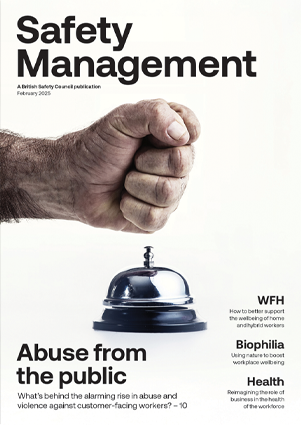Have you ever told a colleague or manager that you feel stressed? Has a colleague ever told you that they feel stressed? If so, how do you feel it was handled?
Features
What’s holding us back from managing stress?
In March this year, an Acas poll revealed that one in three workers feel that their organisation is not effective at handling work-related stress. Taking these findings on face value doesn’t really tell us much, but for those of us with slightly more inquisitive minds, it does raise several questions about stress in the workplace.
Daily work life can place a lot of pressure on us to achieve business outcomes and sometimes this can be to the detriment of staff health and wellbeing.
Some may have the belief that stress (or ‘pressure’) is a good motivator and a natural part of life. They may also think that it’s down to individuals to manage themselves.
Others may be dismissive of their own feelings because they view their work as not being inherently stressful compared with someone who for example works in the emergency services.
 HSE defines stress as ‘the adverse reaction people have to excessive pressures or other types of demand placed on them’. Photograph: iStock
HSE defines stress as ‘the adverse reaction people have to excessive pressures or other types of demand placed on them’. Photograph: iStock
It’s worth noting that stress caused by factors outside of work can also seep into working life and vice versa. Stress does not acknowledge the boundaries between home and work life. The pressures of the day don’t magically disappear when you step through your front door and similarly the problems from home don’t go away when you turn up to work. With a rise in home working, the distinction between home and work has become even more blurred.
According to a recent Acas poll, 63 per cent of employees felt stressed due to the rising cost of living. This could well be you or someone you know.
Though the conversation around mental health has gained much traction over the past few years, we can see there is still much progress to be made when it comes stress management within organisations.
What is stress?
Before we discuss the ways to manage stress at work, how do we define it? The Health and Safety Executive (HSE) defines stress as ‘the adverse reaction people have to excessive pressures or other types of demand placed on them’. Although stress is not an illness, it can still affect a person’s physical and mental health.
There are many signs of stress that can include:
- Poor concentration
- Finding it hard to make decisions
- Being irritable or short tempered
- Tearfulness
- Tiredness
- Low mood
- Avoiding social events.
Events outside of work can contribute to workplace stress, these things can include:
- When someone has died
- Divorce
- Menopause
- Caring responsibilities
- Poor health
- Financial worries.
These lists are not exhaustive but are illustrative of some of the most common causes and signs of stress.
Support in the workplace
There are two main pieces of health and safety law which cover work-related stress:
- The Health and Safety at Work Act 1974 – this puts a ‘duty of care’ on employers to protect their employees from the risk of stress at work
- The Management of Health and Safety at Work Regulations 1999 – this requires all employers to make a ‘suitable and sufficient assessment’ of the risks to the health and safety of their employees at work.
For employers, this means they must identify any risks to their employees’ health and take steps to prevent or reduce work-related stress. An important aspect of identifying the risks of stress, is to create an environment where staff feel they have the ability and confidence to speak openly to their manager about how they are feeling. As well as being honest about areas they are struggling with.
This can be a daunting conversation and can add further stress to the individual if they are concerned that they will be viewed in a negative way as a result of disclosing this information. Therefore, creating a culture that promotes openness around speaking about mental health is key when trying to raise awareness and address stress in the workplace.
At Acas, we believe employers, managers and employees have a shared responsibility to create an environment that is supportive of positive health and wellbeing. Their responsibilities are all slightly different, but all play a key role in creating a supportive and open culture.
 Creating a culture that promotes openness around speaking about mental health is key. Photograph: iStock
Creating a culture that promotes openness around speaking about mental health is key. Photograph: iStock
Employers
It’s important that employers create the conditions to support positive mental health at work. This might include:
- Putting in place a wellbeing strategy, including highlighting accountabilities and measures of success
- Dealing with any causes of work-related stress. This might be in relation to workloads, job design or how change within the organisation is currently being managed. The employer is in a good place to be able to make impactful decisions and changes to address some of these causes.
- Taking action to lessen the stigma around mental health
- Supporting and providing training for their managers to give them the confidence and skill to have conversations about stress and mental health.
Managers
Managers should inform themselves about mental wellbeing and be open to conversations with their team. This includes:
- Building good relationships with their team
- Consulting on and keeping employees informed of changes that impact them. We know this can be a potential stressor at work if not managed carefully.
- Handling difficult conversations effectively. This is important as failure to do so can cause conflict within the workplace, which can also lead to work-related stress.
Individuals
Everyone at work has a responsibility to look after their mental health. This includes:
- Noticing how and when they get stressed. Sometimes stress can creep on people but once the person has recognised it, it’s important to seek out support.
- Using positive strategies to help them cope – these will be different for everyone
- Asking for help and support from line managers when they need it
- Making use of support available in and outside of work.
More information about creating an open culture using our framework can be found on the Acas website here.
It’s important to note that these changes won’t happen overnight and often take a concerted and planned effort before organisations start to see positive results.
However, by appointing an influential champion within the organisation and creating actions plans with accountabilities, the culture will start to take shape where stress and mental wellbeing are proactively considered and not an afterthought.
For free guidance on managing stress at work and supporting employee mental health see: acas.org.uk
Emma Slaven is Customer solutions lead/mental health lead at Acas
FEATURES

How Building Information Modelling can improve the management and delivery of occupational safety and health
By Manuel Tender, Digital4OSH on 07 February 2025
Building Information Modelling has traditionally been used to develop and share digital information, plans and 3D models for the efficient design and construction of buildings and other physical assets, but it also holds huge promise for ensuring the safety of construction projects, from the design phase through to the management of the build itself.

Adaptability, ergonomics and wellbeing: building blocks for the workplace in 2025
By Guy Osmond, Osmond Ergonomics and Alex Reffell, Osmond Inclusive Wellbeing Services on 04 February 2025
Employee expectations around the nature and organisation of office, home and hybrid working have changed significantly in recent years, making it more important than ever for employers to rethink and update their approaches to flexible working, ergonomics and workplace design, to better support employee wellbeing, motivation and job satisfaction.

Supporting wellbeing across the flexible extended workplace: why we need a different approach
By Andy Lake, Flexibility.co.uk on 04 February 2025
Flexible working has been shown to offer numerous benefits, from improved employee wellbeing to greater productivity. But the rapidly changing nature of work in a digital age means employers need to take a strategic, joined-up approach when implementing flexible working practices, if they are to fully realise the benefits.



